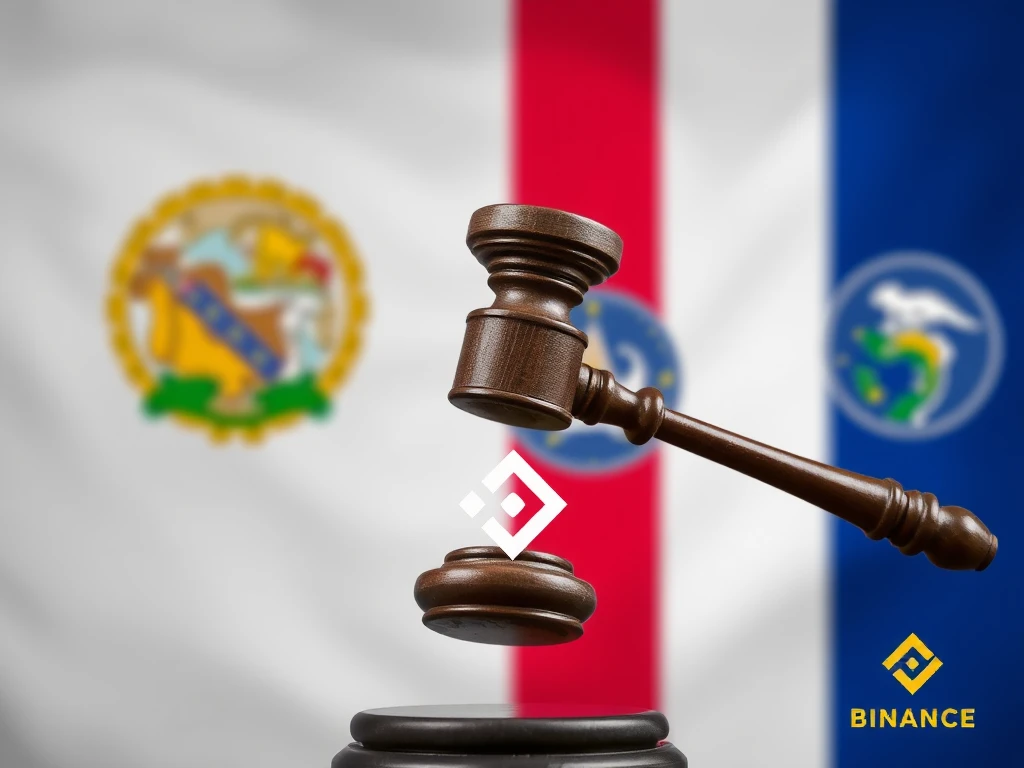Urgent Binance Lawsuit Transferred: Judge Cites ‘First-to-File’ Rule in Florida

In a significant legal development for the cryptocurrency giant Binance, a US judge has ordered the transfer of a lawsuit against the exchange to Florida. This decision, based on the ‘first-to-file’ rule, has sparked discussions across the crypto community. What does this transfer mean for Binance, and how will it impact the ongoing legal battles in the crypto space? Let’s dive into the details of this crucial ruling.
Decoding the ‘First-to-File Rule’ in the Binance Lawsuit Transfer
The crux of this legal maneuver lies in the ‘first-to-file rule.’ But what exactly is this rule, and why is it pivotal in the Binance lawsuit transfer? Essentially, the first-to-file rule is a judicial doctrine that dictates when similar lawsuits are filed in different federal courts, the court that received the first filing generally takes precedence. This is done to promote judicial efficiency and prevent conflicting rulings.
In the context of the Binance lawsuit, Judge Barbara Rothstein in Washington State determined that a lawsuit filed in Florida in June 2023 was substantially similar to a later lawsuit filed in Washington in August 2024. Here’s a breakdown of the situation:
- Florida Lawsuit (First-Filed): Filed in June 2023 by Michael Osterer, alleging Binance aided in the conversion of stolen cryptocurrency.
- Washington Lawsuit (Second-Filed): Filed in August 2024 by three crypto investors, also alleging Binance facilitated money laundering of stolen crypto.
Judge Rothstein stated that despite minor differences in the class descriptions, both lawsuits targeted the same core issue: allegations that Binance allowed cybercriminals to launder money through its platform. This similarity triggered the application of the first-to-file rule, leading to the transfer.
Why Florida? Examining the Court’s Rationale for Transferring the Binance Lawsuit
The decision to transfer the Binance lawsuit to the Southern District of Florida wasn’t arbitrary. Judge Rothstein explicitly cited efficiency and the avoidance of ‘duplicative litigation’ as primary reasons. Imagine two parallel court cases, dealing with almost identical accusations against Binance, proceeding in different states. This scenario would not only strain judicial resources but also create the risk of inconsistent judgments.
According to the legal resource LSD Law, the first court to hear a case typically retains jurisdiction to ensure an orderly and streamlined legal process. Judge Rothstein emphasized this point, stating, “To allow two parallel class actions to proceed in separate districts would be duplicative and inefficient.”
While lawyers for the plaintiffs in the Washington case argued that their lawsuit included additional accusations and named former CEO Changpeng “CZ” Zhao as a defendant, Judge Rothstein remained unconvinced that these differences were significant enough to override the first-to-file rule. She also dismissed concerns that the transfer would cause undue delays, suggesting it would instead streamline the overall legal process.
Crypto Regulation Implications: What This Lawsuit Means for Binance and the Industry
This Binance lawsuit transfer arrives at a crucial juncture for crypto regulation globally. As regulatory scrutiny intensifies on cryptocurrency exchanges, cases like these are closely watched for their potential to set precedents. The allegations of facilitating money laundering are particularly serious and strike at the heart of concerns regulators have about the crypto industry’s potential for illicit activities.
Here’s what this case could signal for crypto regulation:
- Increased Scrutiny: Exchanges, especially large ones like Binance, can expect continued and potentially heightened scrutiny regarding their anti-money laundering (AML) compliance and operational practices.
- Legal Precedent: The outcome of this case, whether in Florida court or through arbitration (as initially ordered in the Florida case), could influence future lawsuits and regulatory actions against crypto exchanges.
- Industry Accountability: The lawsuit underscores the growing demand for accountability within the crypto space. Exchanges are no longer seen as operating outside traditional financial regulations.
It’s important to remember that the Florida court had previously ordered the initial lawsuit to arbitration in July 2024. The implications of this existing order on the newly transferred case remain to be seen and will likely be a key point of legal maneuvering.
Navigating the Legal Maze: What’s Next for Binance and the Lawsuit?
With the Binance lawsuit now heading to Florida, several questions arise. Will the Florida court uphold the previous arbitration order, or will the case proceed in court? How will the plaintiffs’ arguments about additional accusations and the inclusion of CZ as a defendant be addressed in the Florida jurisdiction?
For Binance, this transfer represents a consolidation of legal challenges into a single jurisdiction, which could potentially streamline their defense strategy. However, it also means that the allegations of money laundering facilitation will continue to be a focal point of legal and public attention.
The crypto community will be keenly observing the developments in the Southern District of Florida. This case not only impacts Binance but also carries broader implications for the evolving landscape of crypto regulation and the responsibilities of cryptocurrency exchanges in preventing illicit financial activities.
In Conclusion: A Critical Juncture for Binance and Crypto Regulation
The transfer of the Binance lawsuit to Florida based on the first-to-file rule marks a significant moment in the ongoing legal saga surrounding the exchange. It highlights the increasing convergence of cryptocurrency operations with traditional legal frameworks and regulatory expectations. As the case progresses in Florida, it promises to offer further insights into the legal responsibilities of crypto exchanges and the future direction of crypto regulation. Stay tuned for more updates as this crucial case unfolds.









